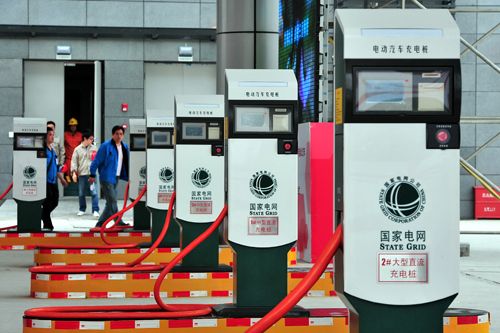


A total of 167,000 charging piles have now been connected to the telematics platform of the State Grid Corporation of China (SGCC), making it the world’s largest electric vehicle (EV) charging network.
By cooperating with 17 charging station operators, the SGCC now offers more than 1 million kilowatt-hours of power each day. In addition, users can complete their payment for the service within the system.
China has built the largest EV charging network in the world to date, with the highest number of facilities, the broadest coverage, and the most advanced technology.
Statistics show that SGCC has built 5,526 charging and battery swap stations and more than 40,000 charging piles since 2006, with a fast-charging motorway network that covers 121 cities in 16 provinces. The average distance between two stations is less than 50 kilometers.
SGCC plans to expand its own charging pile count to 120,000 by 2020, and the inter-city fast charging network will cover Beijing, Tianjin, Hebei, Shandong, all cities in the Yangtze River Delta, and 202 major cities in other regions.
According to SGCC Spokesperson Wang Yanfang, the company will reduce the maximum distance between charging stations to less than 5 kilometers in suburban areas, less than 3 kilometers in inner suburbs, and less than 1 kilometer in urban areas.
 Fire brigade in Shanghai holds group wedding
Fire brigade in Shanghai holds group wedding Tourists enjoy ice sculptures in Datan Town, north China
Tourists enjoy ice sculptures in Datan Town, north China Sunset scenery of Dayan Pagoda in Xi'an
Sunset scenery of Dayan Pagoda in Xi'an Tourists have fun at scenic spot in Nanlong Town, NW China
Tourists have fun at scenic spot in Nanlong Town, NW China Harbin attracts tourists by making best use of ice in winter
Harbin attracts tourists by making best use of ice in winter In pics: FIS Alpine Ski Women's World Cup Slalom
In pics: FIS Alpine Ski Women's World Cup Slalom Black-necked cranes rest at reservoir in Lhunzhub County, Lhasa
Black-necked cranes rest at reservoir in Lhunzhub County, Lhasa China's FAST telescope will be available to foreign scientists in April
China's FAST telescope will be available to foreign scientists in April "She power" plays indispensable role in poverty alleviation
"She power" plays indispensable role in poverty alleviation Top 10 world news events of People's Daily in 2020
Top 10 world news events of People's Daily in 2020 Top 10 China news events of People's Daily in 2020
Top 10 China news events of People's Daily in 2020 Top 10 media buzzwords of 2020
Top 10 media buzzwords of 2020 Year-ender:10 major tourism stories of 2020
Year-ender:10 major tourism stories of 2020 No interference in Venezuelan issues
No interference in Venezuelan issues
 Biz prepares for trade spat
Biz prepares for trade spat
 Broadcasting Continent
Broadcasting Continent Australia wins Chinese CEOs as US loses
Australia wins Chinese CEOs as US loses